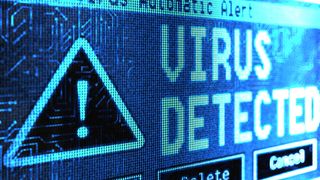It’s an unfortunate fact that most viruses are actually downloaded and installed by the user and although this can be avoided by ensuring you have the best antivirus software installed, you can further protect yourself by reading our guide to the different methods of infection If you want to increase your knowledge even more, read our round-up of 10 of the worst computer viruses you can get.
1. Via Download
Computer viruses frequently hide themselves in legitimate-looking software including games, demos and free utilities or programs, so when downloading software always perform a quick sense-check on the website. Is it plagued with pop-ups or cheap ads of a dubious nature? A quick Google of the site or company’s name is also a good idea, as is scanning the download with a good antivirus program like Bitdefender. If you’re downloading pirated versions of software or games, then there’s a very good chance they’ll contain malware, so don’t!
2. Via Email
Another common method of delivering a virus is via email. This can be spam but can also appear to have been sent by someone you know, as some viruses are capable of emailing themselves to everyone in an infected user’s email address book. Again, most good antivirus software will detect these as they arrive, Norton 360 (opens in new tab) features some great email protection, but it’s good practice never to open an email attachment that you weren’t expecting or which looks suspicious. This includes MS Office documents which can include Macro viruses.
3. Via Bad Links
Links to malicious websites can appear in lots of different places including emails, social media posts, texts messages, forums, online ads and even other websites. Once clicked, the malicious sites they lead to can perform a number of actions that can harm the running of your computer including reading files, accessing sensitive information and transferring viruses. This is often done through use of an Exploit Kit, a toolkit that probes your computer for software that’s not been updated, identifying any security holes and implanting the malware. Good antivirus software will pick them up, for instance Kaspersky (opens in new tab) comes with web filtering to block dangerous URLs, but it also pays to avoid clicking on links that appear in online ads and pop-ups and cancelling any download prompts that might appear. Also, ensure that you install all available updates to your operating system and software as and when the manufacturer releases them. Best home computers 2023: Find all the best desktop PCs and Macs Best laptops 2022 Best DVD ripper software 2022: DVD copying apps Best repair software for PC 2023: read this before opening up your PC case Best tablets 2023: the best of iPad, Android, Samsung and more Reviews The Apple MacBook Air M2 is almost as good as the Pro, but it’s a fraction of the price Acer Aspire Vero review Logitech Streamcam review Logitech Brio Ultra HD Webcam review iPad Pro 2021 M1 review
Common sense and care
As well as installing a solid antivirus, or upgrading to one of the best internet security software (opens in new tab), the most effective way to protect yourself from computer viruses is by being careful, avoiding suspicious links and downloads, and keeping your computer’s operating system up to date.

